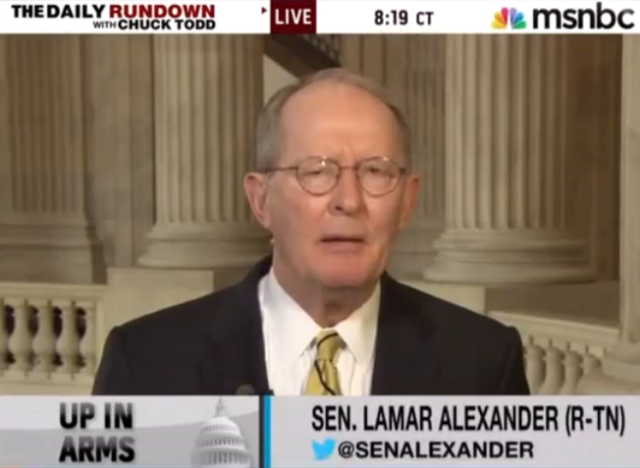
Since the Sandy Hook shooting last month and the national gun control debate it has reignited, there has been plenty of controversy over whether video games and violent media in general are a convenient distraction for the gun lobby or an area worthy of more study. But of all the thousands of words expended on the topic, the ones uttered by US Senator Lamar Alexander (R-TN) take the video game blame game to a whole new level.
Speaking with NBC News' Chuck Todd this morning, Alexander responded to a question about universal background checks with this amazing non-sequitur:
I think video games is a bigger problem than guns, because video games affect people. But the First Amendment limits what we can do about video games and the Second Amendment to the Constitution limits what we can do about guns.
First off, bonus points to Alexander right off the bat for mentioning gaming's First Amendment protections in practically the same breath as its supposed harms. That already puts him a step ahead of people like Missouri state Rep. Diane Franklin and others who want to single out violent video games for a tax that is likely unconsitutional. The comparison between the First Amendment and the Second Amendment here is actually a pretty good rhetorical flourish, and it's an interesting way of trying to convince traditional anti-gun advocates to see the gun-rights position from a different perspective (though I doubt it will change many people's minds in and of itself).
That little turn of phrase doesn't excuse the first part of the statement, though. The obvious implication of worrying more about games "because they affect people" is that guns have no effect on people—a dubious proposition, at best.
Even excepting that, though, the term "affect people" is so wishy washy here that it becomes practically meaningless. Yes, games do affect people, just like any work of art. But as the Supreme Court pointed out in its ruling granting games First Amendment protection, the demonstrated effects of violent games on youth in the scientific literature "are both small and indistinguishable from effects produced by other media."
Yet if Alexander had said, "I think TV is a bigger problem than guns, because TV affects people," he'd have been laughed out of the room. That's because TV has been an established part of the cultural landscape for the entire memory of almost every person alive today. Thus, TV's effects, both good and bad, are a well-known quantity to practically everyone. Video games, on the other hand, are still seen as a new and hard-to-understand media bogeyman by many of the elderly voters who vote in disproportionate numbers and, consequently, by many of the politicians they help put in office.
The fact is that we will probably have to put up with people in power making ridiculous statements like this for at least a decade or two more. But don't despair, gamers. There will come a time when we will have a president not much older than Mortal Kombat and a ruling class that grew up knowing the gaming medium was just one of a long line of moral panic scapegoats whose history can be traced back to the novel (PDF). Until then, just learn to accept these kinds of statements as part of the political background noise, and save your rage for the lawmakers who are actually trying to limit your freedoms.
reader comments
388